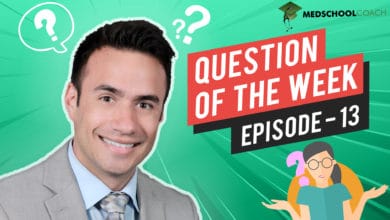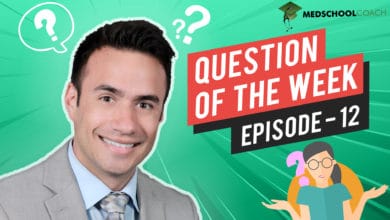USMLE Question of the Week
Acute Onset Tachycardia and Shortness of Breath in an Elderly Adult
In Episode 40 of Med School Question of the Week for USMLE, Faustine Ramirez, MedSchoolCoach expert tutor, answers this medical school question:
A 76-year-old man presents to the emergency department with sudden onset of palpitations and shortness of breath. He has a history of coronary artery disease, previous myocardial infarction six months ago, hypertension, and congestive heart failure. His medications include aspirin, atorvastatin, lisinopril, and metoprolol. He is afebrile, heart rate is 150/min, respiratory rate is 20/min, and blood pressure is 146/82. He appears anxious and uncomfortable. He is alert and oriented to person, place, and time. Cardiovascular examination reveals normal S1 and S2. Neck veins are not distended, and no murmurs are auscultated. Extremities are warm and well perfused and radial pulses are 2+ bilaterally. Breath sounds are clear to auscultation bilaterally and respirations are mildly labored. EKG is performed (see in the video).
Shortly after completing the EKG, the patient starts complaining of chest pain and dizziness. Vital signs are repeated and demonstrate: heart rate 180/min, respiratory rate is 22/min, and blood pressure is 76/42. You palpate a tachycardic radial pulse. What is the next best step in management?
- Adenosine
- Amiodarone
- Procainamide
- Ibutilide
- Magnesium
- Epinephrine
- Synchronized cardioversion
- Unsynchronized cardioversion




